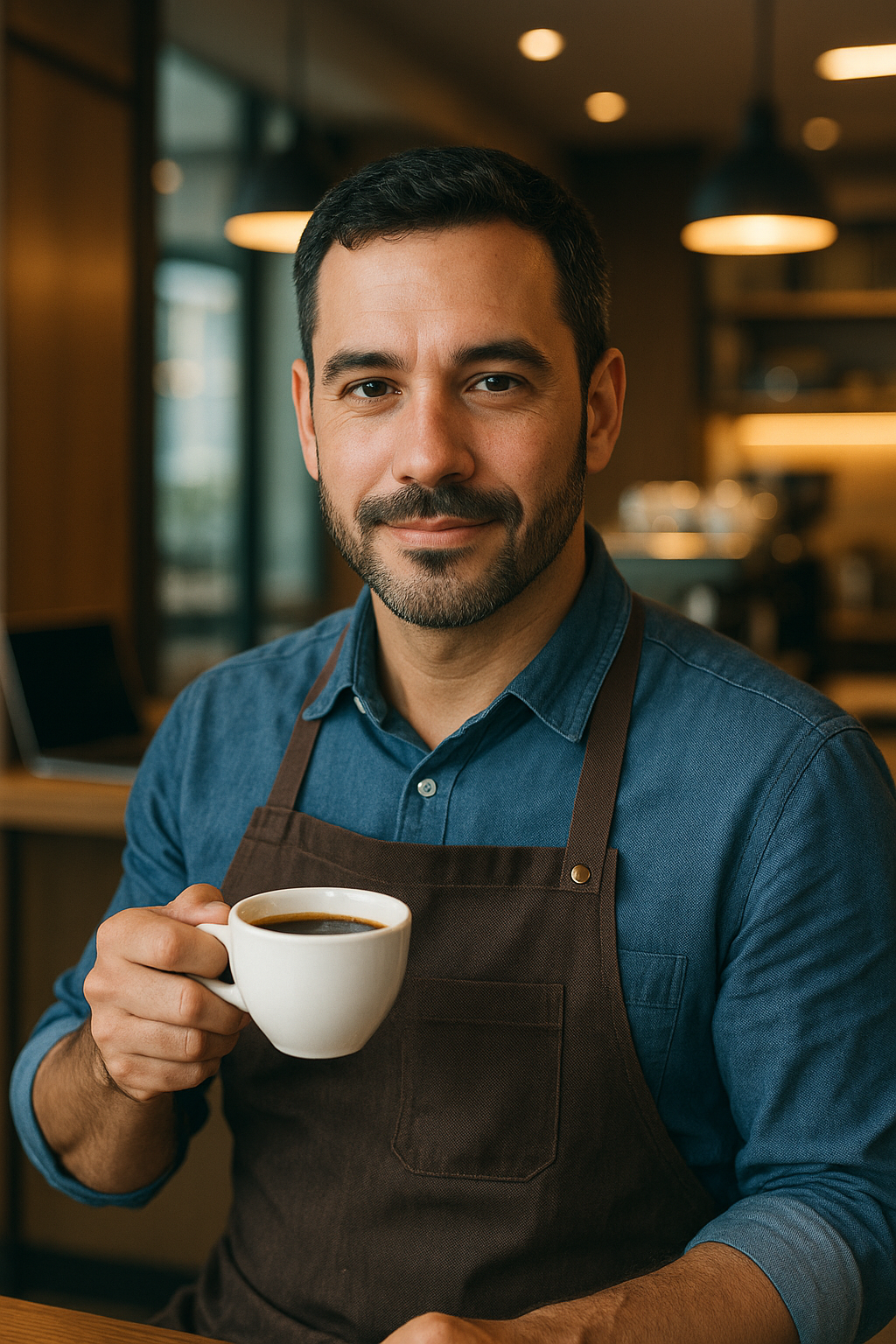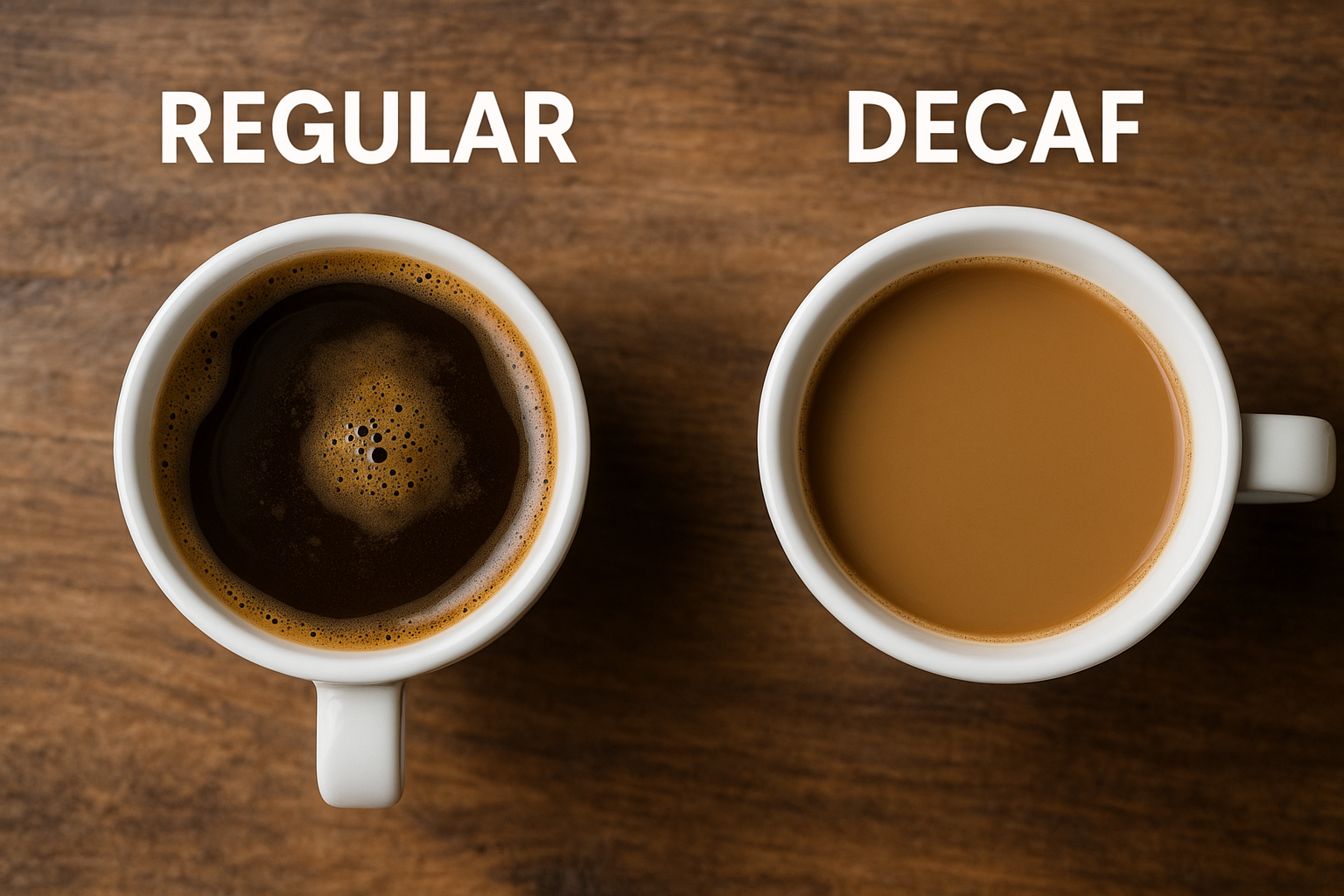For many coffee lovers, the question isn’t whether to drink coffee—it’s which kind to drink. Regular or decaf?
Both options offer rich flavor, ritual, and comfort. But they serve different purposes depending on your goals, sensitivities, and daily routine. Understanding the differences between decaf and regular coffee can help you choose what best supports your lifestyle.
In this article, you’ll discover the key distinctions between regular and decaffeinated coffee, their health benefits, when to drink each one, and how to enjoy both without compromising flavor or well-being.
What’s the Real Difference?
The main difference between regular and decaf coffee is the caffeine content.
- Regular coffee contains anywhere from 70 to 140 mg of caffeine per 8 oz cup, depending on the beans, roast, and brewing method.
- Decaf coffee has had most of its caffeine removed, typically leaving 2 to 5 mg per cup.
Decaf isn’t completely caffeine-free, but it’s significantly lower in caffeine than its regular counterpart.
The flavor of decaf can also be slightly different due to the decaffeination process, though high-quality decaf retains much of the aroma and taste.
How Is Coffee Decaffeinated?
There are several methods for removing caffeine from coffee beans, usually before roasting. The most common include:
- Swiss Water Process – Uses water and osmosis, no chemicals. Preserves flavor well.
- CO2 Process – Uses pressurized carbon dioxide to extract caffeine. Gentle and efficient.
- Solvent Methods – Use ethyl acetate or methylene chloride. Widely used but less natural.
The Swiss Water Process is often preferred for those looking for a more natural, chemical-free decaf option.
When to Choose Regular Coffee
Regular coffee has its place in many routines, especially for those who enjoy its energizing effect and rich taste.
Choose regular coffee if:
- You need a morning boost or mental clarity
- You’re working, studying, or exercising
- You’re not sensitive to caffeine
- You want to improve focus and alertness
- You enjoy the full strength and flavor of traditional coffee
Just be mindful of how much caffeine you consume and at what times of day—especially if it affects your sleep or stress levels.
When to Choose Decaf Coffee
Decaf is ideal for those who want the ritual and taste of coffee without the stimulating effects of caffeine.
Choose decaf if:
- You’re drinking coffee in the late afternoon or evening
- You’re sensitive to caffeine (jittery, anxious, or can’t sleep)
- You’re pregnant or nursing
- You enjoy coffee for flavor or comfort
- You’re trying to cut back on caffeine for health reasons
Many people find that decaf allows them to enjoy multiple cups of coffee daily without side effects.
Can You Mix Both in Your Routine?
Absolutely. In fact, using both regular and decaf is a smart way to enjoy coffee throughout the day without overloading on caffeine.
Here’s a simple routine:
- Morning: 1–2 cups of regular coffee for energy and focus
- Late morning or lunch: Optional light cup of regular or half-caf
- Afternoon: Decaf to enjoy the ritual without disrupting sleep
- Evening: A calming decaf cup with a snack or book
This allows you to enjoy coffee’s taste and comfort all day long while keeping your energy stable.
Flavor Considerations
Modern decaf coffee has come a long way. In the past, decaf was known for being flat or bitter—but now, specialty roasters offer high-quality decaf with complex flavor profiles.
Look for:
- Single-origin decaf for unique taste notes
- Swiss Water Process for better bean integrity
- Medium roast for balance
- Freshly ground beans for full aroma
Experiment with different origins and brewing methods to find a decaf that you truly enjoy.
Health Benefits of Both
Both regular and decaf coffee offer health benefits beyond caffeine:
- Rich in antioxidants
- Supports digestion
- May promote heart and brain health
- Improves mood and daily rhythm
Decaf retains most of the same antioxidants and nutrients found in regular coffee. That means you’re still getting benefits—even without the buzz.
Regular coffee’s added advantage is caffeine, which can temporarily improve alertness, endurance, and reaction time. But for those sensitive to caffeine, these effects can be overstimulating.
Managing Caffeine Intake for Better Sleep
Caffeine stays in your system for 6 to 10 hours, depending on your metabolism. That means a cup of coffee at 3:00 p.m. could still be affecting your sleep at 10:00 p.m.
If you struggle with falling asleep or staying asleep, consider switching to decaf in the afternoon and evening.
Even if you don’t feel jittery, caffeine can reduce sleep quality. Decaf allows you to enjoy the comfort of a warm drink without disrupting your rest.
Coffee and Anxiety: When Decaf Helps
If you notice that regular coffee makes you feel anxious, irritable, or physically tense, caffeine may be the cause.
Try replacing your second or third cup with decaf to see if your mood stabilizes. Some people feel a huge difference just by cutting their caffeine intake in half.
Decaf lets you maintain the coffee ritual without triggering nervous energy or tension.
Is Decaf “Less Healthy” Than Regular?
No. Decaf coffee still offers many of the same benefits as regular coffee, just without the stimulating effect. It’s not “weaker” or nutritionally empty.
In fact, for people who need to limit caffeine, decaf is the healthier choice. It lets them enjoy coffee without side effects.
The key is choosing high-quality decaf and treating it with the same care you’d give to any other brew.
Final Thoughts: It’s Not One or the Other
Choosing between decaf and regular coffee doesn’t need to be a permanent decision. You can shift depending on your schedule, mood, and needs.
Some days you need energy. Other days you need comfort. Both are valid.
By understanding how each type affects you, you can create a coffee routine that truly supports your body, mind, and lifestyle.
Enjoy your coffee—whatever form it takes. Brew with care, sip with presence, and drink in the moment.

Marcelo Oliveira is a coffee enthusiast and content creator specializing in barista skills, brewing methods, equipment reviews, coffee-related health insights, and fascinating curiosities from the coffee world. With a deep passion for every step of the brewing process, he turns technical knowledge into accessible and engaging content for both beginners and seasoned coffee lovers. Marcelo’s goal is to help readers appreciate the full experience of coffee—from bean to cup.
